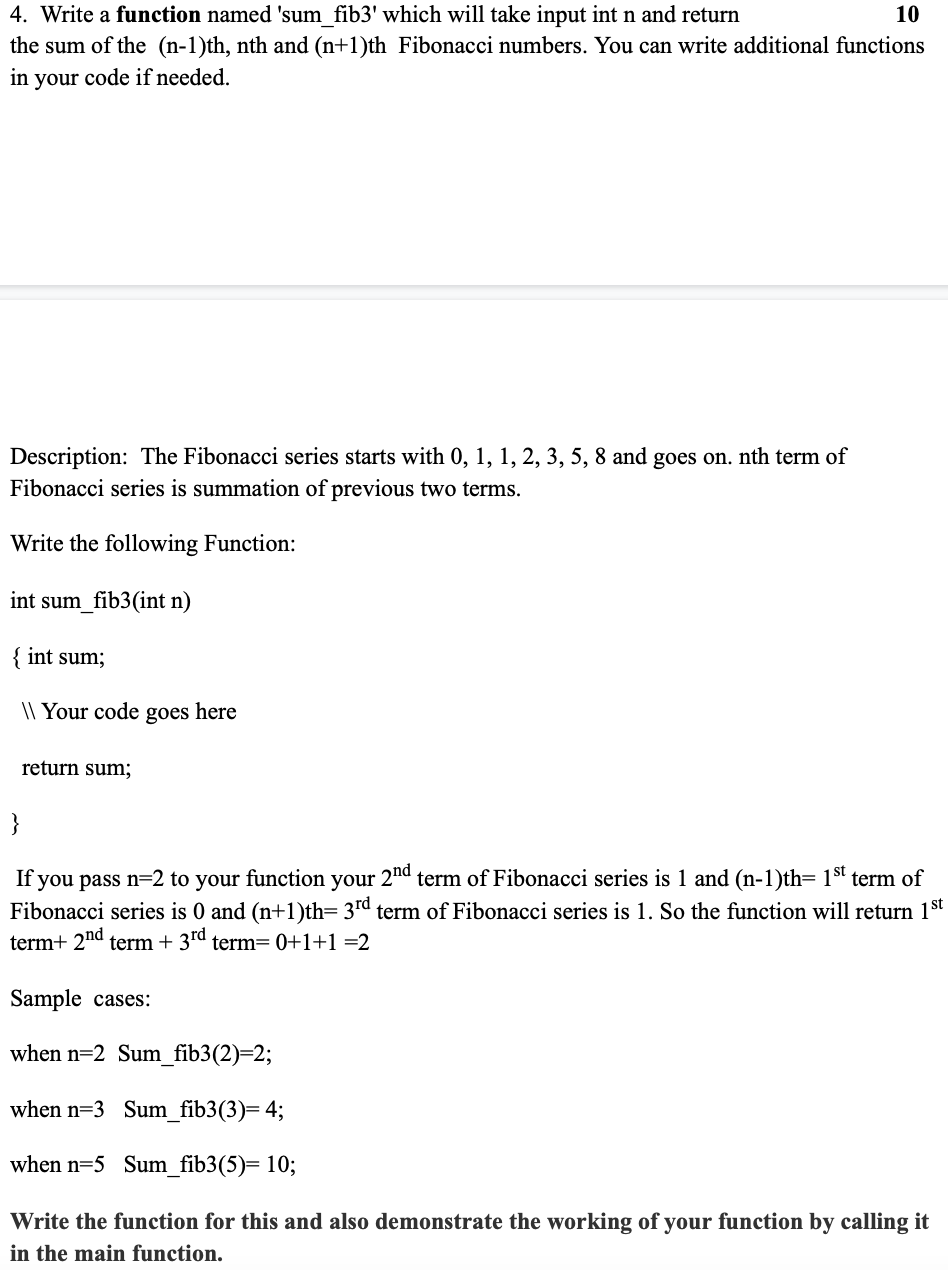4. Write a function named 'sum_fib3' which will take input int n and return the sum of the (n-1)th, nth and (n+1)th Fibonacci numbers. You can write additional functions 10 in your code if needed. Description: The Fibonacci series starts with 0, 1, 1, 2, 3, 5, 8 and goes on. nth term of Fibonacci series is summation of previous two terms. Write the following Function: int sum_fib3(int n) { int sum; || Your code goes here return sum; } If you pass n=2 to your function your 2nd term of Fibonacci series is 1 and Fibonacci series is 0 and (n+1)th= 3rd term of Fibonacci series is 1. So the function will return 1 term+ 2nª term + 3rd term= 0+1+1 =2 -1)th= 1st term of Sample cases: when n=2 Sum_fib3(2)=2; when n=3 Sum_fib3(3)= 4; when n=5 Sum_fib3(5)= 10; Write the function for this and also demonstrate the working of your function by calling it in the main function.
4. Write a function named 'sum_fib3' which will take input int n and return the sum of the (n-1)th, nth and (n+1)th Fibonacci numbers. You can write additional functions 10 in your code if needed. Description: The Fibonacci series starts with 0, 1, 1, 2, 3, 5, 8 and goes on. nth term of Fibonacci series is summation of previous two terms. Write the following Function: int sum_fib3(int n) { int sum; || Your code goes here return sum; } If you pass n=2 to your function your 2nd term of Fibonacci series is 1 and Fibonacci series is 0 and (n+1)th= 3rd term of Fibonacci series is 1. So the function will return 1 term+ 2nª term + 3rd term= 0+1+1 =2 -1)th= 1st term of Sample cases: when n=2 Sum_fib3(2)=2; when n=3 Sum_fib3(3)= 4; when n=5 Sum_fib3(5)= 10; Write the function for this and also demonstrate the working of your function by calling it in the main function.
C++ for Engineers and Scientists
4th Edition
ISBN:9781133187844
Author:Bronson, Gary J.
Publisher:Bronson, Gary J.
Chapter6: Modularity Using Functions
Section6.1: Function And Parameter Declarations
Problem 3E
Related questions
Question
Solve it in C

Transcribed Image Text:4. Write a function named 'sum fib3' which will take input int n and return
the sum of the (n-1)th, nth and (n+1)th Fibonacci numbers. You can write additional functions
10
in your code if needed.
Description: The Fibonacci series starts with 0, 1, 1, 2, 3, 5, 8 and goes on. nth term of
Fibonacci series is summation of previous two terms.
Write the following Function:
int sum_fib3(int n)
{ int sum;
|| Your code goes here
return sum;
}
If you pass n=2 to your function your 2"d term of Fibonacci series is 1 and (n-1)th= 1st term of
Fibonacci series is 0 and (n+1)th= 3rd term of Fibonacci series is 1. So the function will return 1st
term+ 2nd term + 3rd term= 0+1+1 =2
Sample cases:
when n=2 Sum_fib3(2)=2;
when n=3 Sum_fib3(3)= 4;
when n=5 Sum_fib3(5)= 10;
Write the function for this and also demonstrate the working of your function by calling it
in the main function.
Expert Solution
This question has been solved!
Explore an expertly crafted, step-by-step solution for a thorough understanding of key concepts.
This is a popular solution!
Trending now
This is a popular solution!
Step by step
Solved in 3 steps with 3 images

Knowledge Booster
Learn more about
Need a deep-dive on the concept behind this application? Look no further. Learn more about this topic, computer-science and related others by exploring similar questions and additional content below.Recommended textbooks for you

C++ for Engineers and Scientists
Computer Science
ISBN:
9781133187844
Author:
Bronson, Gary J.
Publisher:
Course Technology Ptr

C++ Programming: From Problem Analysis to Program…
Computer Science
ISBN:
9781337102087
Author:
D. S. Malik
Publisher:
Cengage Learning

C++ for Engineers and Scientists
Computer Science
ISBN:
9781133187844
Author:
Bronson, Gary J.
Publisher:
Course Technology Ptr

C++ Programming: From Problem Analysis to Program…
Computer Science
ISBN:
9781337102087
Author:
D. S. Malik
Publisher:
Cengage Learning